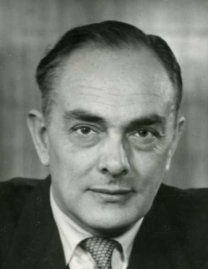Guillaume Landré
Guillaume Landre was born on 24 February 1905 in The Hague (Netherlands). His father Willem Landre was a professional composer and the first teacher of Guillaume Landre. During his early years he also received lessons by Henri Zagwijn. Upon completion of school Guillaume Landre moved to Utrecht and studied law at the university but also continued his compositional studies under Willem Pijper.
After his studies Guillaume Landre worked as a music critic for the newspaper "De Telegraaf" and also as a lecturer in commercial law and economics at a business school in Amsterdam for several years. Beside these activities Guillaume Landre also continuously composed music which was widely recognised and performed. After World War II Guillaume Landre quit his former activities and became the secretary of the Culture Council of the Netherlands. With his combination of being an expert on law and music Guillaume Landre successfully fulfilled this task and was afterwards appointed to many other important positions in the Dutch music history: He was the president of the Dutch Composer Society, vice-president of the International Society for Contemporary Music and head of the Dutch branch of the ISCM, filled positions in the management of Donemus, the Concertgebouworkest, the Dutch Opera Foundation as well as worked as an expert on music copyright issues for the BUMA (the Dutch collecting society for composers). In 1964 Guillaume Landre received the renowned Sweelinck-Award for his lifetime achievements.
Guillaume Landre died on 6 November 1968 in Amsterdam (Netherlands).
The work catalogue of Guillaume Landre contains compositions from all genres. He composed the operas "Jean Levecq" and "La symphonie pastorale" as well as an opera-comique "De Snoek", 4 symphonies, several other orchestral compositions, concertos for violin, cello, piano, flute and clarinet, 4 string quartets, 2 wind quintets, other works for chamber ensembles and "Piae memoriae pro patria mortuorum" for choir and orchestra.
In my possession is the autograph manuscript of the piano reduction of the "Concerto for violin and small orchestra". The work was composed in 1928 during Guillaume Landre's last year at university in Utrecht. Neither the full score nor the piano reduction was ever published. And as far as I know the concerto also remains unperformed.
I was not able to contact the actual copyright holders of the compositions by Guillaume Landre and therefore could not receive a permission to publish the score of this important, but neglected violin concerto. I have nevertheless typeset the piano reduction, so if you are interested in the score please contact me to see if there is a way to let you have a look.
